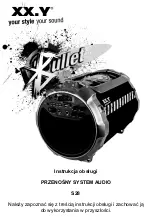
11
ULTRA-Q PRO PEQ2200
4.2 Rear panel control elements
Fig. 4.3: Rear panel elements of the ULTRA-Q
11
SERIAL NUMBER
. Please take the time to have the warranty card filled out completely by your special-
ized dealer and return it within 14 days after the date of purchase, so as to be entitled to benefit from our
extended warranty. Or use our online registration option available on the Internet at www.behringer.com.
12
FUSE HOLDER / VOLTAGE SELECTOR
. Please make sure that your local voltage matches the
voltage indicated on the unit, before you attempt to connect and operate the ULTRA-Q PRO. Blown
fuses may only be replaced by fuses of the same type and rating.
13
MAINS CONNECTION
. Use the enclosed power cord to connect the unit to the mains. Please also note
the instructions given in the INSTALLATION chapter.
14
AUDIO IN
. These are the audio inputs of your ULTRA-Q PRO, available both as balanced 1/4" jack and
XLR connectors.
15
AUDIO OUT
. These are the audio outputs of your ULTRA-Q PRO. Matching phone jack and XLR
connectors are wired in parallel.
5. TECHNICAL BACKGROUND
5.1 Introduction
The ULTRA-Q PRO combines the technical properties of both parametric equalizers and narrow-band notch
filters. Owing to its variable bandwidth ranging from 0.03 to 2 octaves, it is much more flexible than conventional
EQs. Its innovative circuit topology gives you the appropriate tools to solve acoustic problems of any kind.
The ULTRA-Q PRO also has two additional filters which enable you to adapt the entire frequency response to
meet your specific application. These low and high-cut filters have a slope of 12 dB/oct. and can be varied in a
wide frequency range. Practice has shown how important this feature is, as most acoustic problems are
encountered in the extreme low and high frequency ranges. Typical frequency response, hum or feedback
problems must be handled differently. The additional low and high-cut filters allow for a broad-band correction
of the frequency curve, while the parametric filters can be used to process narrow frequency bands (mains
hum, feedback, etc.).
The control elements are clearly and logically arranged. Turn the BANDWIDTH control counter-clockwise to
adjust the minimum quality of 0.03 octaves, and clockwise to adjust the maximum bandwidth. Turn the LEVEL
control clockwise to raise, or counter-clockwise to lower the filter amplitude. The FREQUENCY control works
on the same principle.
5. TECHNICAL BACKGROUND







































